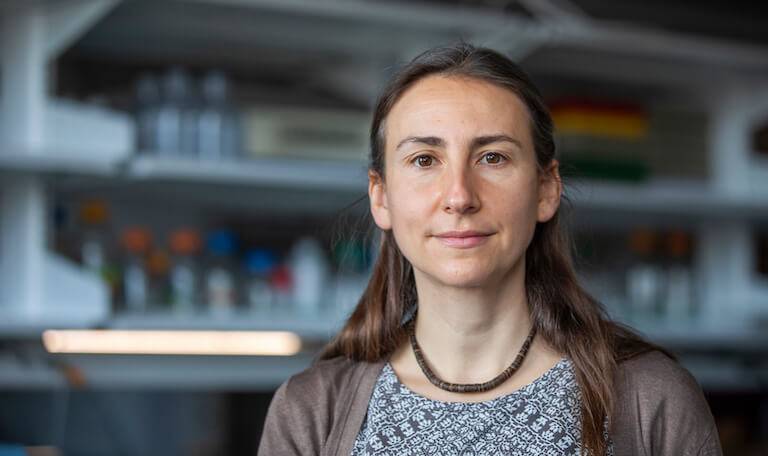2023 Bailey Award to Support Health and Conservation of Threatened Iowa Bee Species
By Caitlin Ware, Iowa State University Office of the Vice President for Research
Posted Feb 23, 2023

By Caitlin Ware, Iowa State University Office of the Vice President for Research
Posted Feb 23, 2023

Iowa State University’s 2023 Bailey Research Career Development award has been granted to a university researcher with her eyes set on mastering the emerging field of conservation genomics in order to answer a question with major environmental impact: where have all the bees gone?
The Bailey award — administered by the Iowa State University Office of the Vice President for Research (OVPR) — is given each year to faculty whose work is high-risk, high-reward and addresses emerging scientific, technical, or societal problems. Amy Toth, professor of Ecology, Evolution, and Organismal Biology (EEOB), was recently selected for the annual award and will receive $149,000 in institutional funding over a period of three years. Toth’s research project, titled “Uniting Conservation and Genomics to Address Bee Declines,” will investigate how diet and how bees forage, pathogens and parasites, and bioindicators of health and disease play a role in declining bee species.
“We are losing pollinators at an unprecedented rate,” Toth said. “They are tremendously important for the crops we depend on and global ecosystems in general. In fact, a bee is responsible for every third bite of food we as humans consume. If we are losing large numbers of pollinators and species of pollinators, this has major ramifications for how the world functions. If we can better understand why they are declining, we can use that information to make better management decisions about how we use our land, how we approach habitat restoration, and how we continue global trade. It’s not just about bees, it’s about building a more sustainable model for humans to get what we need out of the earth while also preserving it for future generations.”
Conservation genomics is a novel field that integrates “big data” with genomic sequencing, the process of determining the entirety of the DNA sequence of an organism’s genome, to aid in the conservation of endangered species. As part of her project, Toth — in collaboration with Andrew Severin, manager of the Genome Informatics Facility and adjunct assistant professor in EEOB — will focus on using the approach to study multiple species of bumble bees currently found in Iowa.
There are over 15 different species of bumble bees in the state, some of which are thriving, and others that are nearly extinct or have gone locally extinct. Toth and her team plan to take an “inside and out” approach through genetically sequencing not only bees themselves and their internal organs, but also the pollen found on the legs of live bees – a process called metagenomics. By grinding up existing insect samples, analyzing pollen samples, and sequencing all available materials, information can be collected on nearly every aspect of a bee’s life and activity, from the types of plants it interacted with to diseases with which it could be infected.
As a result, Toth believes that answers to questions including where specific bees prefer to forage, which diseases are decimating certain species of bees, and what resources are needed to reverse widespread population decline will become available.
“This project is a culmination of the work I have been doing over the last 15 years,” Toth said. “I have always had these two threads, conservation of bees and bee health and then genetics and genomics. But finally putting them together feels like a very natural marriage. We are also using machine learning, which is very exciting and will allow us to take large data sets and use them to predict if a bee is healthy or not based on what we sequence out of them. This project will utilize the knowledge and tools we have in genetics and genomics and apply it to questions that can hopefully provide us with some valuable information in terms of making the world a better place through policy, environmental practice, and so much more.”
Over the course of three years, Toth plans to execute a three-pronged, genomics-led initiative: characterizing bee forage plants using bee-collected pollen samples representing four bee species; addressing known and emerging diseases, which are suspected to be the biggest contributor to bee population decline; and developing bee genetic health indicators using machine learning. The impact of the project results could extend into land management, urban planning, environmental resilience, human welfare, and beyond, according to Toth.
“The diversity and numbers of pollinators have a huge impact on the productivity, viability, and sustainability of our world’s agriculture and food production systems. The decline of their populations is alarming and something we must address as a research community,” said Vice President for Research Peter Dorhout. “Dr. Toth’s work – applying machine learning to conservation genomics to aid our critical pollinator populations – is the essence of the Bailey award: fostering research that is innovative, increases our knowledge, and has practical applications.”
The Bailey Research Career Development award, established in 2002 with a gift from Carl A. and Grace A. Bailey, is open to all Iowa State University full-time tenured associate professors and professors. More information about the application, review, and award process can be found here.